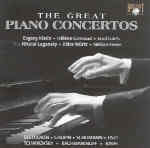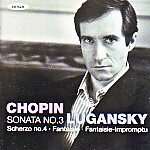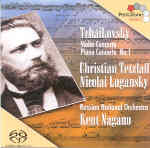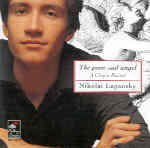

Until now, Nikolai Lugansky has recorded prolifically but unevenly, bouncing around from label to label. However, Lugansky’s recent contract with Harmonia Mundi may well bring

Most of the performances gathered in this 6-disc compilation have circulated on myriad labels, as well as in other collections issued by Brilliant Classics. There’s

Nikolai Lugansky’s latest Chopin offering flits back and forth between insightful inspiration, neutral diffidence, and lackluster musicianship. Sometimes you get all three qualities in the

Carefully worked out voicings, rubatos, and dynamic scaling characterize Nikolai Lugansky’s approach to the Appassionata sonata’s tumultuous first movement. The overall effect, however, is sectional

Nikolai Lugansky and Sakari Oramo turn in a solid and smartly paced reading of the Rhapsody on a Theme of Paganini that matches the high

Prokofiev’s Sixth Sonata may not match the Seventh’s war-horse status, yet it too has been served by many first-rate recordings, from umpteen Sviatoslav Richter versions

These are very fine performances, realistically recorded in multichannel sound. It’s always good to hear Christian Tetzlaff, a violinist with a reputation for “coolness” that

In a catalog crowded with superb performances of Rachmaninov’s First and Third concertos, Nikolai Lugansky’s world-class pianism and Sakari Oramo’s solid, sparkling support (thanks of

The Poor, Sad Angel refers to Chopin through the eyes of George Sand. I imagine listeners are expected to keep this image in mind when

Smooth, relatively uninflected, and suavely modulated pianism characterizes Nikolai Lugansky’s interpretations of Rachmaninov’s Op. 23 Preludes, Op. 16 Moments Musicaux, and the ubiquitous C-sharp minor
![]()
